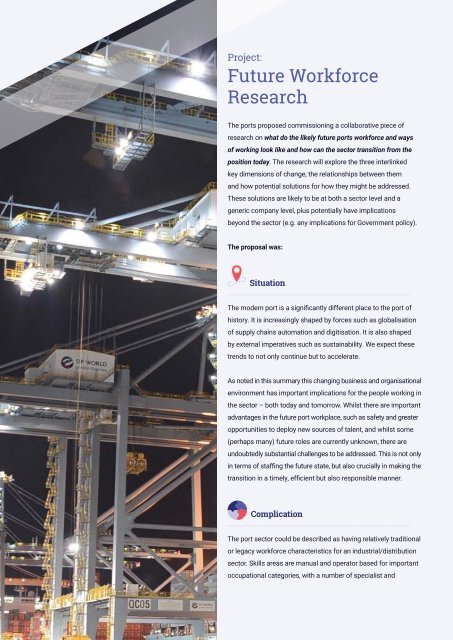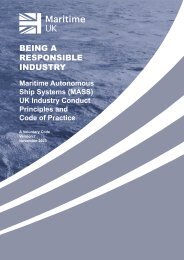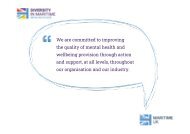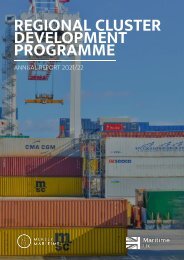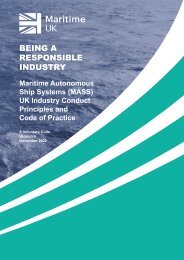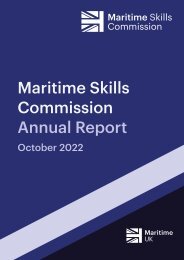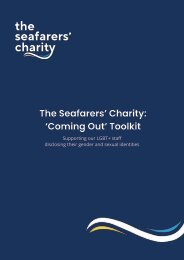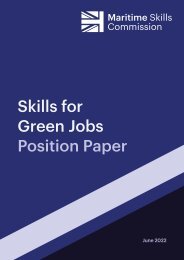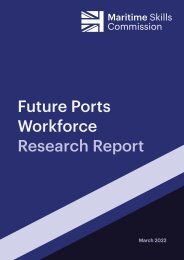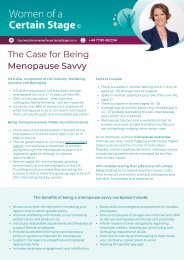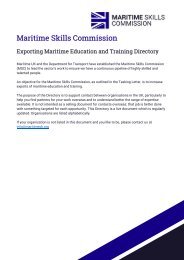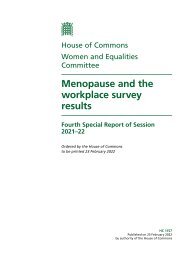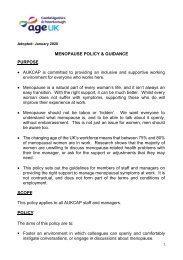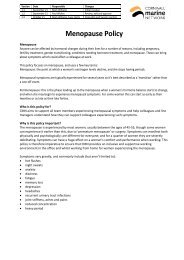Maritime Skills Commission - Annual Report October 2020
We are delighted to release the first Maritime Skills Commission Annual Report.
We are delighted to release the first Maritime Skills Commission Annual Report.
Create successful ePaper yourself
Turn your PDF publications into a flip-book with our unique Google optimized e-Paper software.
<strong>Annual</strong> <strong>Report</strong> <strong>2020</strong> - 21<br />
Project:<br />
Future Workforce<br />
Research<br />
The ports proposed commissioning a collaborative piece of<br />
research on what do the likely future ports workforce and ways<br />
of working look like and how can the sector transition from the<br />
position today. The research will explore the three interlinked<br />
key dimensions of change, the relationships between them<br />
and how potential solutions for how they might be addressed.<br />
These solutions are likely to be at both a sector level and a<br />
generic company level, plus potentially have implications<br />
beyond the sector (e.g. any implications for Government policy).<br />
The proposal was:<br />
Situation<br />
The modern port is a significantly different place to the port of<br />
history. It is increasingly shaped by forces such as globalisation<br />
of supply chains automation and digitisation. It is also shaped<br />
by external imperatives such as sustainability. We expect these<br />
trends to not only continue but to accelerate.<br />
As noted in this summary this changing business and organisational<br />
environment has important implications for the people working in<br />
the sector – both today and tomorrow. Whilst there are important<br />
advantages in the future port workplace, such as safety and greater<br />
opportunities to deploy new sources of talent, and whilst some<br />
(perhaps many) future roles are currently unknown, there are<br />
undoubtedly substantial challenges to be addressed. This is not only<br />
in terms of staffing the future state, but also crucially in making the<br />
transition in a timely, efficient but also responsible manner.<br />
relatively sector specific categories (e.g. VTS operators, harbour<br />
masters, pilots). The age profile skews towards the more<br />
mature cohorts, with a low level of voluntary churn in many<br />
occupational categories. The sector’s gender mix is heavily<br />
male weighted with a 85:15 split (although better than other<br />
maritime sectors). A significant portion of the workforce work<br />
shifts and can be subject to short notice flexibility requirements.<br />
The sector has high levels of union membership and collective<br />
bargaining coverage. Reward packages for many occupational<br />
categories are also fairly traditional, with overtime, shift premia<br />
and pensions being key features. Recruitment and promotion<br />
has historically been relatively unstructured.<br />
Of course, a legacy basis brings strengths as well. Jobs are<br />
typically well paid as well as being around 50% more productive<br />
than the UK average and not seasonal. There is strong<br />
commitment to high quality apprenticeships and ‘craft’ training.<br />
In many cases a strong sense of responsibility towards the local<br />
communities around the ports, where most of the workforce<br />
hail from and where the port operator can be one of the larger<br />
private sector employers. The sector has a low to zero gender<br />
pay gap. The sector also has its own dedicated skills (and<br />
safety) entity, Ports <strong>Skills</strong> and Safety.<br />
TALENT & SKILLS<br />
Attracting & retaining<br />
Core skills in short supply<br />
(e.g. engineering, marine)<br />
New skills in competitive<br />
fields (e.g. IT, digital)<br />
DIVERSITY<br />
WAYS OF WORKING<br />
Positive change is occurring. Many major port operators<br />
are putting in place much more structured programmes of<br />
recruitment and promotion, as well as driving increases in<br />
diversity. Tough choices have been made on some legacy<br />
aspects, such as aspects of pensions. But the sector recognises<br />
that more change, more quickly is required. However, making<br />
this change successfully and in a responsible manner requires<br />
a better understanding of three interlinked dimensions of the<br />
future ports workforce.<br />
Resolution<br />
Achieving a better understanding of these dimensions,<br />
and the ways to address them is not a unique challenge to<br />
any one individual port operator (although the specifics of<br />
implementation inevitably will be).<br />
Therefore, the major port operators wish to commission a piece<br />
of common piece of research to explore the three interlinked<br />
key dimensions of change highlighted above,<br />
the relationships between them and how potential solutions for<br />
how they might be addressed. These solutions are likely to be at<br />
both a sector level and a generic company level, plus potentially<br />
have implications beyond the sector (e.g. any implications for<br />
Government policy). The overall ‘exam question’ is ‘what do the<br />
likely future ports workforce and ways of working look like and<br />
how can the sector transition from the position today’.<br />
We anticipate that the research will require a mixture of desk<br />
research and structured interviews. We also anticipate that<br />
meaningful insights from the work are likely to prompt some<br />
hard thinking by a range of stakeholders, including but certainly<br />
not limited to, the ports operators themselves.<br />
Complication<br />
The port sector could be described as having relatively traditional<br />
or legacy workforce characteristics for an industrial/distribution<br />
sector. <strong>Skills</strong> areas are manual and operator based for important<br />
occupational categories, with a number of specialist and<br />
Attracting and developing<br />
talented people of all<br />
genders and ethnicities,<br />
reflective of the communities<br />
in which we operate<br />
Having the working<br />
environments and practices<br />
that allow all to thrive<br />
Working practices that<br />
reflect both the changing<br />
needs of business but also<br />
changing expectations/<br />
requirements of the<br />
workforce<br />
Effective and constructive<br />
collective relationships<br />
Current Situation<br />
The bid was presented to the <strong>Commission</strong> by the UKMPG<br />
in September <strong>2020</strong> and was endorsed under the Scheme of<br />
Work as will engage across the UK ports sector.


